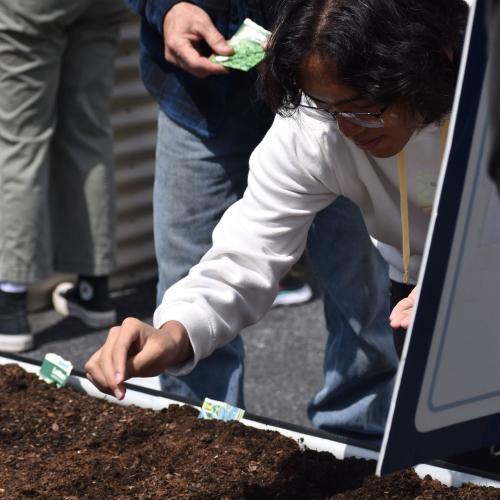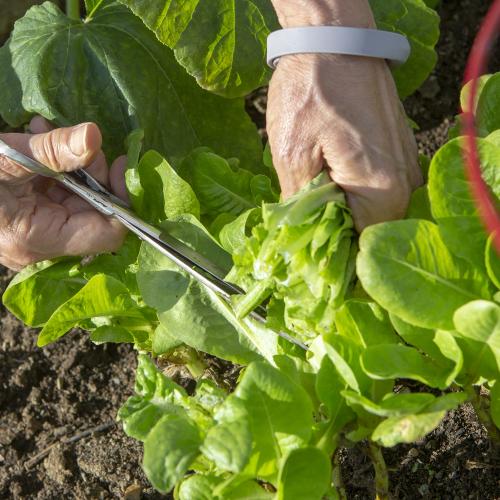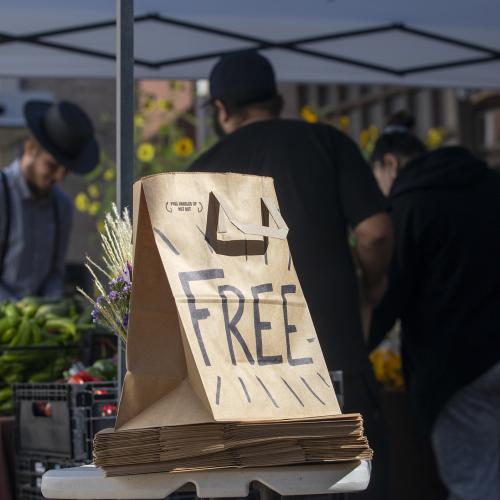Through hands-on learning, access to fresh food and a chance to get outside and get your hands dirty, student farms and gardens at several Penn State Commonwealth Campuses offer students an opportunity to grow and learn outside of a traditional classroom.
Commonwealth Campuses promote wellness, education through gardens
Students explore sustainability, wellness through gardens at seven Penn State campuses
Several Penn State campuses offer an opportunity to connect with nature and learn about produce through student farms and gardens. Those opportunities can enrich the student experience, and even add tangible learning to what they read about in textbooks. Credit: Penn State Shenango Garden. All Rights Reserved.
UNIVERSITY PARK, Pa. – At seven of Penn State’s Commonwealth Campuses, campus gardens and farms help students learn and connect with nature, advance sustainable food practices and promote mental well-being. The plots at campuses range in size from a few dozen square feet to multiple acres, but each of them shows students new ways to engage with nature and the community around them.
Combined, the programs donate hundreds of pounds of food each year to local food banks, including Lion’s Pantry. They sell produce through farmer’s markets or stands in the community and provide plants for research and in-class demonstrations. Some are open for visitors to take food as they please, or to practice yoga and mindfulness in an outdoor space.
Across the wide range of programs, the gardens and farms are united in the goal to improve the lives of their campuses and surrounding communities. For those who participate, they offer a broader sense of understanding: where food comes from, why it matters and how to grow it themselves.
A place for education and exploration
Even small gardens offer a range of opportunities for learning. From managing pests to making paints, each campus offers its own opportunities to develop a better understanding of the natural world.
At Penn State Fayette, a little more than 2,800 square feet of land shows students the importance of plants across cultures.
Students can learn about the importance of medicinal plants at Penn State Fayette, where the garden includes a medicine wheel and additional crops with cultural significance. Credit: Courtesy of Dave Meredith, Penn State Fayette. All Rights Reserved.
“My concept is to talk about the food ways of different cultures. We’ve got a Native American corner, an African American corner, a Peruvian corner, Mexican plants scattered throughout,” said retired Professor of Mechanical Engineering Dave Meredith, who volunteers to maintain the space.
The garden showcases over 110 different varieties of plant, ranging from soybeans and chickpeas to squash and hibiscus. It also includes a medicine wheel, which showcases medicinal plants from indigenous cultures, as well as an area for broom corn, which was used to make brooms before the invention of plastics.
Hands-on experiences also help principles and data from textbooks and lectures feel more concrete. The gardens become an extension of a classroom, said Rose Rowe, a fourth-year biology student and garden intern at Penn State Brandywine.
“I've been gardening for a long time, but when I was gardening here, it was completely different,” Rowe said. “You get to really see the relationships between the bugs and the plants, the beneficial bugs and the pests. You can see the echoing effects of everything around you.”
Bringing the classroom outdoors was a large part of the motivation at Penn State Berks, where Mahsa Kazempour, an associate professor of science education and chair of the Sustainability Council, worked to set up a campus garden in a central location on campus.
"We were thinking about the possibility of having something more visible and more accessible than the greenhouse, which is located at the outer edge of the campus grounds," Kazempour said. "We liked the idea of a living lab right in the middle of the campus that would be extremely visible and appealing, not only to the student population, but also to the faculty and staff and everybody else in the community."
The campus garden aims to be interdisciplinary, Kazempour said, bringing different groups together to learn about how their studies work in the context of the community space. It's been a little over a year now since the garden started, she said, and they've worked to bring different groups in to discuss how the garden can be helpful to them. That includes counseling services, the Lion Ambassadors and faculty from various disciplines.
"We like having different faculty or different offices talk about how they incorporate the campus garden,” Kazempour said. "We're trying to get people to think outside the box and think of the campus garden as a way of teaching and engaging students while also thinking about the bigger goal of addressing food security by providing access to fresh vegetables and herbs.”
Working with others, whether that’s with a garden manager or other students interning with the garden, offers endless opportunities to discover something new, Rowe said.
“We bounce ideas back and forth because that's kind of what agriculture is. It's a constant learning process,” Rowe said. “Our environment around us changes, the weather changes, but the way we operate and the way we plant things is all to make it as successful as possible.”
Practicing mental wellness
At Penn State Shenango, Student Affairs staffer Tony Paglia’s initial proposal to build a garden in 2011 focused on the benefits that an outdoor space can have on mental wellness.
Paglia, who works as a mental health therapist and disabilities coordinator, comes from a family of gardeners and knows firsthand the benefits of spending some time with your hands in the dirt.
“A mental health piece is definitely built into it. An opportunity to be outside in the fresh air, get some physical activity, some sunshine,” Paglia said. “There’s also the positive feeling of gardening and seeing the fruits of your labor.”
The garden at Penn State Shenango is small, with ten beds of varying sizes. But students have stepped up to take ownership of the area, Paglia said.
Penn State Shenango Student Affairs staffer Tony Paglia runs the gardens with the help of students and other staff and faculty. The space allows room for them all to destress and spend some time in the outdoors, but it also brings the benefits of fresh produce to campus. Credit: Penn State Shenango Garden. All Rights Reserved.
“The students keep coming back and they connect. They’re having open conversation, or they're friends, or they're just spending time together,” Paglia said. “Mental health may not be something that they talk about directly, but I can see the benefits for them in those moments of connection.”
Those feelings of connection are a driving factor for Mia Pisano, who just finished her first year at Penn State Shenango.
“After a long day, I like getting to dig around and make room for some plants. That's relaxing to me,” Pisano said. “I like getting my hands dirty.”
The space has given her a part of campus where she can go to relax and relieve some stress, particularly during midterms or finals. The program has helped her get through her coursework – and connect with her family.
"My grandpa, who I never got to know too much, had a great green thumb. When I was younger and tried to plant things, it seemed like I could get them to grow, too,” Pisano said. “I like that I can keep doing it here.”
The mental health benefits of gardening helped to spur one campus garden into action during the coronavirus pandemic. Sarah Nilson, an assistant professor of biology at Penn State Beaver, took over the student farm in 2021.
“We don’t have students in the summer to grow produce, so it’s easier to grow flowers during our growing period in the spring,” Nilson said. “And during the pandemic, we thought those could cheer up a lot of people.”
Flowers grown on the farm are often donated to nursing homes and academic courses for study. The bouquets can bring a lot of joy to people, Nilson said, including students who visit.
“Students really enjoy seeing the growing process, especially in the winter when it's just so bleak,” Nilson said. “Students in January, February, will tell me that being outside, moving and growing stuff, really improved their mood.”
Third-year student Cody Lewis has found benefits from a variety of tasks in the garden, not just tending to plants. When a door in the garden began to fall apart, she and another student worked to reassemble it and get it back in order.
During her time with the garden at Penn State Beaver, student Cody Lewis has found a love for flowers. She's learned to dry them, and helped prep for classes to make paint pigments from them. Credit: Courtesy of Cody Lewis, Penn State Beaver. All Rights Reserved.
“That was so much fun. Taking out the pieces and putting everything back, and even ripping up plants, is very therapeutic,” Lewis said.
Lewis even found a new hobby that takes advantage of the Beaver garden’s flower beds.
“We harvest plants and then dry them so [Nilson’s] class can make paints from them. I found out that I absolutely love drying flowers,” Lewis said. “I grew up on a farm, but it was mostly cows. It’s really neat to get to learn how to do all this stuff with the produce.”
The joy of the experience is what keeps some students coming back to the gardens. For recent Penn State Brandywine graduate and garden intern Ndella Jagne, showing others what can be done in the gardens was the highlight of her work.
“Seeing how their face lights up because they see something they've never seen before, or they see their favorite produce in a different color that they don’t recognize is one of the best parts,” Jagne said.
Jagne helped with the ribbon cutting for the garden last year and the weekly harvest days. The work gave her new appreciation for gardening, she said.
“When you're in the rush of school, you don't see that you should probably take a step back and rest,” Jagne said. “It's a good way to engage in nature in ways that you haven't really thought of before and relax.”
Learning sustainability firsthand
Sustainability is a big part of the garden’s mission at Penn State Brandywine, according to garden manager and adjunct professor Emily Dozor. Her own class comes to the garden as part of its curriculum to learn about sustainable practices, she said.
“We're reading and learning lessons around sustainable agriculture and United Nations development goals, and then seeing how that sustainability relates to the garden,” Dozor said.
Harvested vegetables are sent to the campus community and local food banks, and food waste from the dining halls is used for composting on campus, Dozor said. The process provides a look at sustainable practices.
Many of the student gardens at the Commonwealth Campuses offer the produce through farm stands and food pantries. The effort brings healthy food options to areas where people may not regularly have access to them, or might not have the resources to buy them. Students and community members alike benefit from the programs, which are open to the public. Credit: Penn State Health Community Gardens. All Rights Reserved.
“I try to incorporate native Pennsylvania plants and pollinator-friendly plants,” Dozor said. “So many students have never really connected with nature in any real, hands-on way. This can get them inspired to connect with nature, even just to ask, ‘Where does my food come from?’”
The garden is building a seed library, Dozor said, and she’s interested in expanding composting to more of the campus. The idea, she said, is to show visitors ways to incorporate sustainable practices into their lives.
“It’s important to support students as they’re piecing together this idea of sustainable food and what that means and how they can empower themselves,” Dozor said.
Other campuses have similar initiatives to spread gardening habits. Penn State Beaver offers a seedling sale, which allows customers to take a piece of the garden home. It was run this year by recent alum Emma Hupp, who interned with the farm through her graduation from the agricultural program in spring 2024.
“The farm brings the community together,” Hupp said. “You get to be more sustainable by growing your own vegetables, and you learn how to take care of the plants.”
The campus garden at Penn State Abington closed a few years ago due to factors like the COVID-19 pandemic and changes at the campus. But Michele Grinar, faculty member in the biology department and one of the garden's founders, said they're currently working to reopen the space because of the benefits it brings to campus. The initial garden had grown out of a desire from the community, without any outside funding or support, but it flourished due to love and support from students, faculty and staff.
“We were taking boards from our homes, wherever we could find them, to put together raised garden beds," Grinar said. "We ended up with open and closed compost systems, a shed, and a greenhouse."
The garden gave classes, campus groups and programs a place to gather and learn. This semester, students have been searching for a location on campus to start again and bring the facility back. Grinar submitted applications for a space this month, although she said there are plans to begin planting in other areas while the garden is still out of commission.
“Even if we don't get approved for those sites, there are opportunities for us to start other kinds of learning gardens," Grinar said. "We've got a lot of peripheral planting scheduled around campus in October. But we do want a centerpiece garden on campus in the future."
An event celebrating the opening of the Penn State Berks campus garden included signs and presentations from student groups, and offered introductions to the world of gardening. That included tables to highlight the importance of pollinators like bees and butterflies. Credit: Michelle Surine, Penn State Berks / Penn State. Creative Commons
For many students, the campus gardens are their first time growing and harvesting their own food. Programming often starts with teaching them how. At Penn State Berks, where the garden is moving into its second year, nearly everyone who stops by is still in those learning stages, according to assistant teaching professor Jayne Park-Martinez.
“We need to teach people basics. How do you pick a tomato or a pepper without damaging the plant? When is produce like beets ready to harvest?” Park-Martinez said.
The garden team is focused on making the space accessible and open to students, she said. That involves frequent communication, like signs about the garden in the food pantry to alert students to where and how fresh food can be harvested. And professors like Park-Martinez can take classes to the garden during the semester to teach them about the vegetables and herbs.
Michelle Surine, a member of the Sustainability Council on campus, started her work with the Berks garden through a class project focused on sustainability. She and other students collected trash and food waste to utilize for art projects, and the work reminded her of the importance of sustainability.
“I have a passion for gardening and environment, and I practice sustainability as much as I can on my own,” Surine said. “It's important to me, especially if I know I can have an impact.”
Surine is working to spread the word about the garden to other students who can get involved. In her work with the Sustainability Council, she said, teaching others about environmental health and best practices is one of her missions.
“It would be great to see the entire campus participate in these programs somehow, because we want to promote that community and that sustainable lifestyle,” Surine said.


